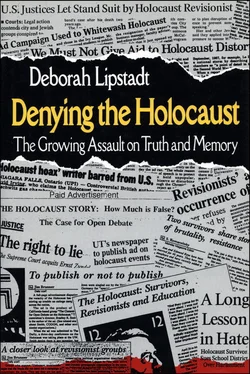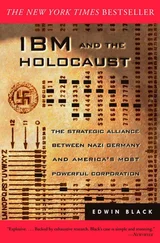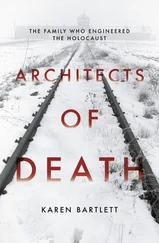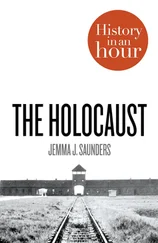Ibid., p. 306.
The American Mercury was founded and edited for many years by H. L. Mencken. Under Mencken it was recognized as one of the literary lights of the American scene, publishing the works of Sinclair Lewis, Eugene O’Neill, Carl Sandburg, and Robert Frost. Mencken sold it in 1935. It then became an increasingly conservative publication. In 1955 Time magazine reported that most of its top editors had quit because they were convinced that “attempts were being made to introduce antisemitic material” into the magazine.
Debunking, p. 309.
Arnold Forster, “The Ultimate Cruelty,” ADL Bulletin (June 1959), pp. 1ff.
Ibid., p. 2.
Ibid.
Benjamin H. Freedman, “Six Million Jew Hoax,” Common Sense (May 1, 1959).
Forster, “The Ultimate Cruelty,” p. 2.
Arthur Butz, “The International ‘Holocaust’ Controversy,” Journal of Historical Review (Spring 1980), p. 6.
Our Sunday Visitor, June 14, 1959; Forster, “The Ultimate Cruelty,” p. 7.
Forster, “The Ultimate Cruelty,” p. 7.
Peter Baldwin, “The Historikerstreit in Context,” in Reworking the Past: Hitler, the Holocaust and the Historians’ Debate, ed. Peter Baldwin (Boston, 1990), p. 24.
Paul L. Berman, “Gas Chamber Games: Crackpot History and the Right to Lie,” Village Voice, June 10–16, 1981, p. 40; Harry Elmer Barnes, The Court Historians Versus Revionism, n.p., n.d., p. 3.
Novick, That Noble Dream, p. 208.
Charles A. Beard to Harry Elmer Barnes, June 28, 1924, Barnes Papers, Box 79, cited in Novick, That Noble Dream, p. 212.
His trip to Germany to expound on the Versailles treaty had a major impact on his subsequent historical views, Brainwashing, p. 24.
Brainwashing, pp. 13, 18.
Harry Elmer Barnes, “Revisionism and the Promotion of Peace,” Journal of Historical Review (Spring 1982), p. 61. This article originally appeared in Liberation (Summer 1958) and was subsequently republished as a pamphlet.
H. E. Barnes to C. C. Tansill, Nov. 7, 1950, cited in Doenecke, Not to the Swift, p. 105.
Barnes, “Revisionism and the Promotion of Peace,” p. 65.
Ibid., pp. 67–68.
H. E. Barnes to W. L. Neumann, Feb. 8, 1952, cited in Doenecke, Not to the Swift, p. 104.
Barnes, “Revisionism and the Promotion of Peace,” p. 68.
Harry Elmer Barnes, The Struggle Against the Historical Blackout (n.p., 1952), p. 11.
Barnes, “Revisionism and the Promotion of Peace,” p. 72.
Brainwashing, p. 3.
Harry Elmer Barnes to Oswald Garrison Villard, October 28, 1948, Harvard University.
Harry Elmer Barnes to Oswald Garrison Villard, March 5, 1949, Harvard University.
Brainwashing, p. 5.
Ibid.
Lucy Dawidowicz, “Lies about the Holocaust,” Commentary, Dec. 1980, p. 32.
David Leslie Hoggan, The Forced War: When Peaceful Revision Failed (Torrance, Calif., 1989).
Hoggan, The Forced War, p. 156.
Hilberg, The Destruction of European Jews, p. 92.
Hoggan, The Forced War, p. 101.
U.S. Department of State, Foreign Relations of the United States, 1938, vol. 2 (Washington, D.C., 1938), pp. 391–92.
Hoggan, The Forced War, p. 101.
U.S. Department of State, Foreign Relations of the United States, 1938, vol. 2, p. 361.
Helmut Krausnick, then director of the Institute for Contemporary History in Munich, charged that Hoggan had actually engaged in forgery in the preparation of the book. See Krausnick’s foreword to Hermann Graml’s critique of Hoggan, Geschichte in Wissenschaft and Unterricht, August 1963, cited in Dawidowicz, “Lies About the Holocaust,” p. 32.
See Gerhard L. Weinberg’s review in American Historical Review, vol. 68, no. 1 (October 1962), pp. 104–5.
Brainwashing, p. 42.
Ibid. Barnes translated some of Rassinier’s works into English. See Lewis Brandon, “Introduction,” The Barnes Trilogy: Three Revisionist Booklets by Harry Elmer Barnes, Historian, Criminologist, Sociologist, Economist (Torrance, Calif., 1979). Brandon was the alias used by David McCalden, the first director of the Institute for Historical Review.
Harry Elmer Barnes, “ZionistFraud,” American Mercury , Fall 1968, reprinted in an appendix to The Myth of the Six Million (Los Angeles, 1969), p. 117.
Brainwashing, p. 32.
Ibid., p. 33.
Ibid.
Ibid., p. 37 (italics added).
Harry Elmer Barnes, “Revisionism: A Key to Peace,” Rampart Journal (Spring 1966), quoted in Dawidowicz, “Lies About the Holocaust,” p. 33 (italics added).
Harry Elmer Barnes, “The Public Stake in Revisionism,” Rampart Journal (Summer 1967), pp. 19–41, republished in Journal of Historical Review (Fall 1980), p. 217 (italics added) (hereafter referred to as “The Public Stake”).
“The Public Stake,” p. 218 (italics added).
He specifically referred to Look, Mar. 21, 1967; Saturday Evening Post, Oct. 22, 1965, and Feb. 25, 1967. “The Public Stake,” pp. 205–30.
“The Public Stake,” p. 219 (italics added).
Ibid., p. 225 (italics added).
Ibid., p. 223 (italics added). Barnes apparently thought Brzezinka and Birkenau were two separate camps. Birkenau is the English translation of Brzezinka. Jonowska is Janówska.
Ibid., p. 222.
Gitta Sereny, “The Men Who Whitewash Hitler,” New Statesman, Nov. 1979, p. 670.
Even the former East Germany, which until 1990 did not accept responsibility for the Holocaust, acknowledged that it had occurred. It blamed the fascists, who persecuted the Communists.
Читать дальше












